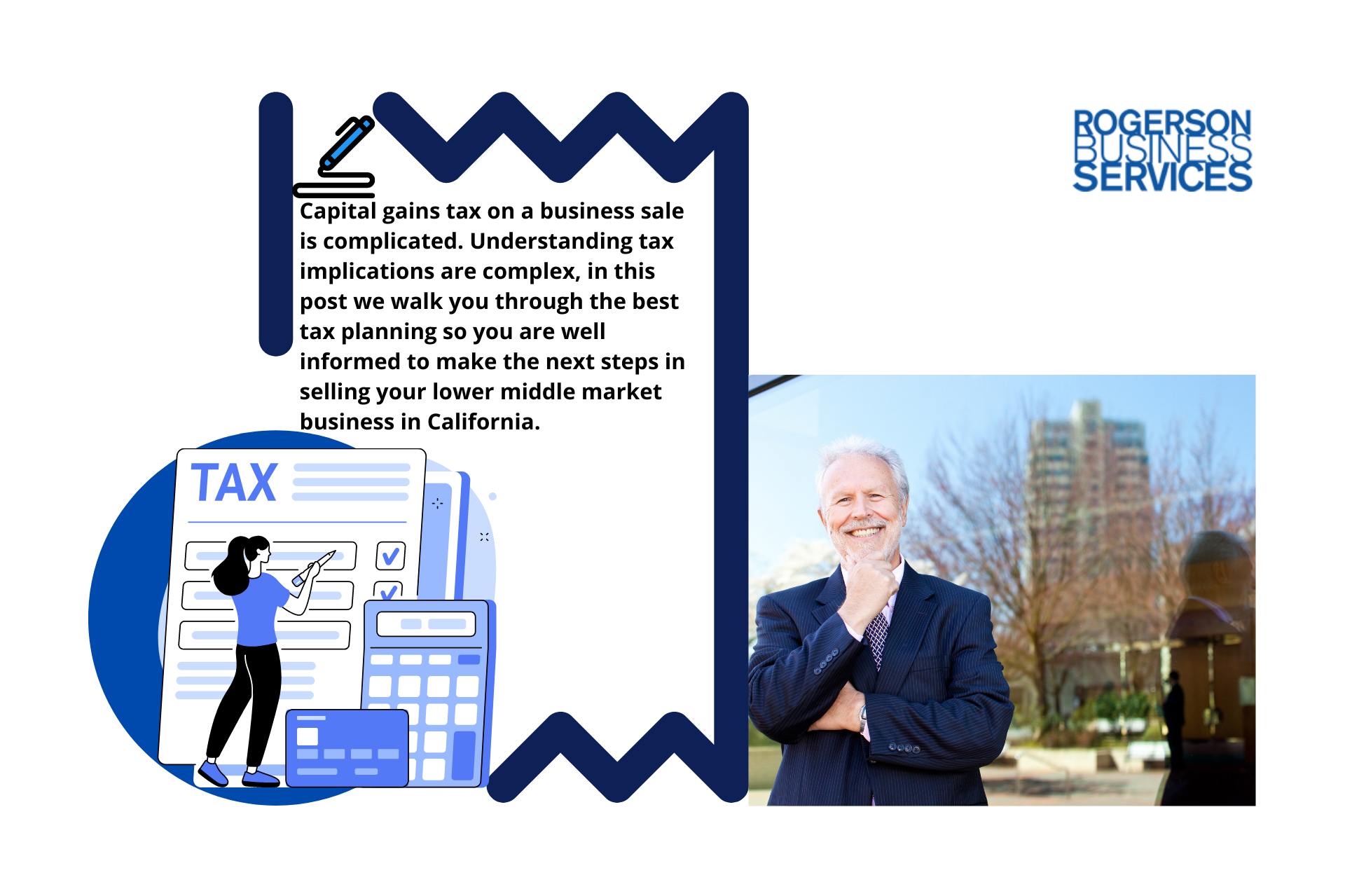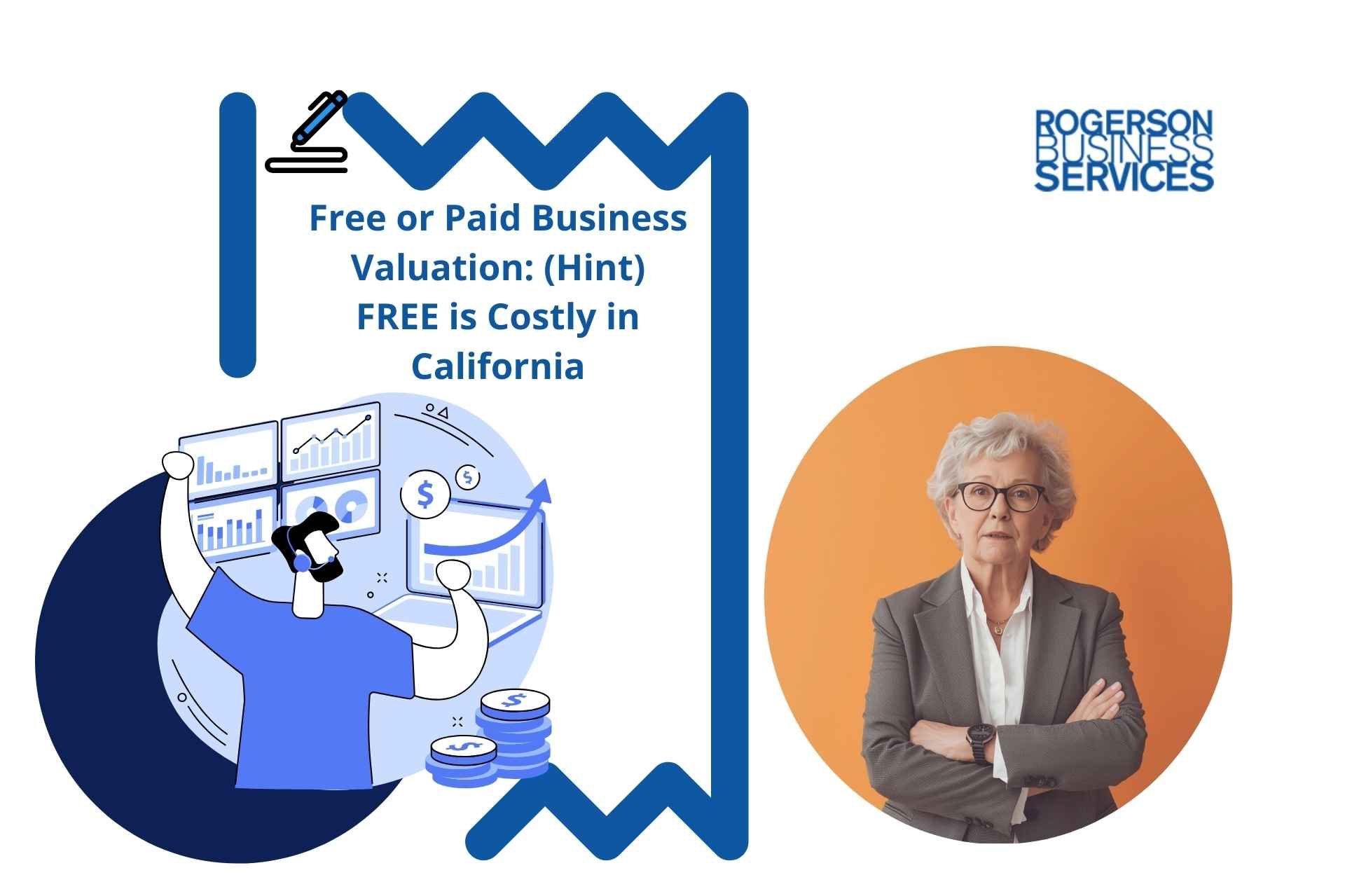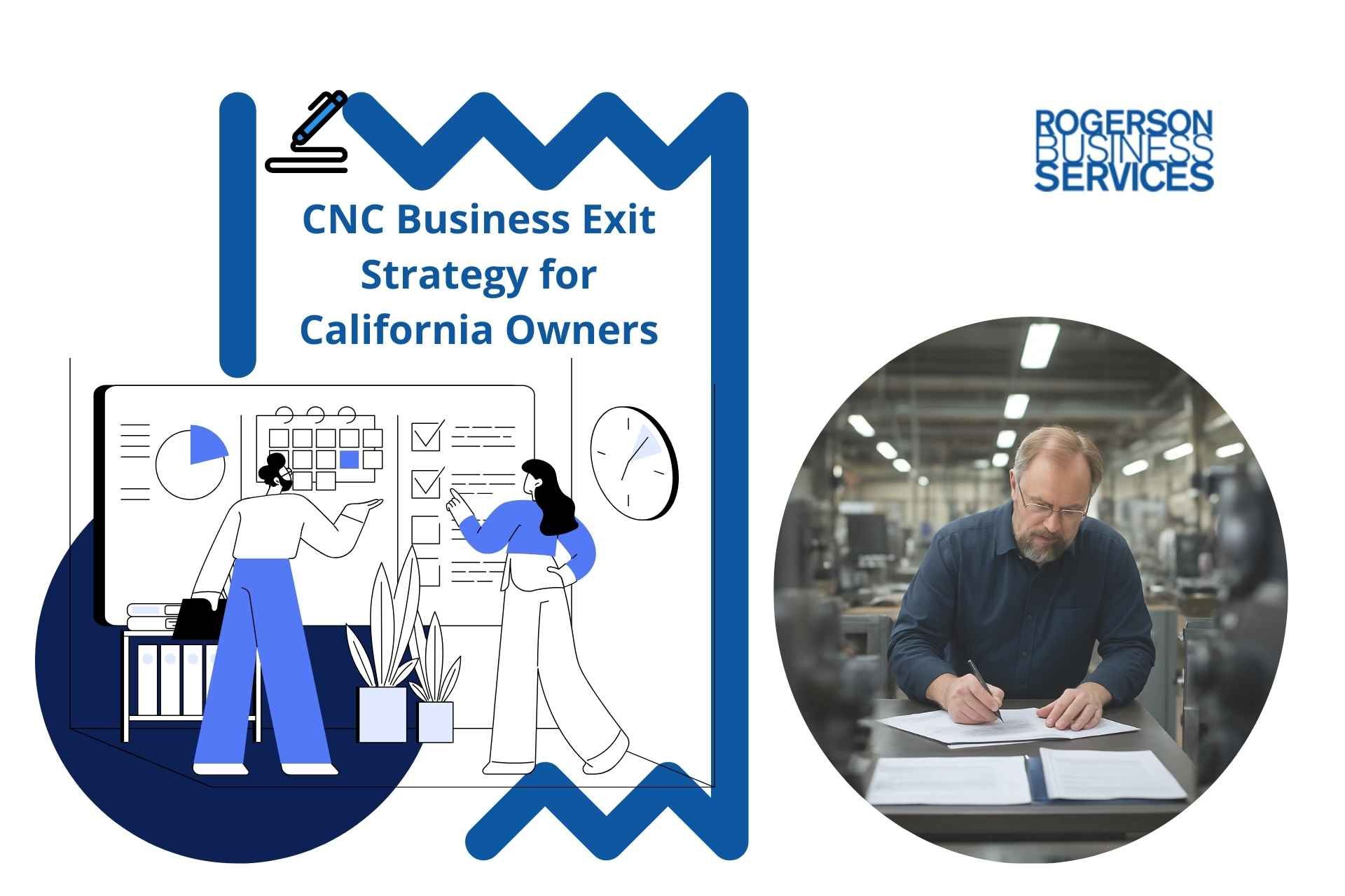Is Selling a Business Considered Capital Gains in California?
Capital Gains Tax on Business Sale
Capital gains tax on a business sale is complicated. Understanding tax implications are complex, in this post we walk you through the best tax planning so you are well informed to make the next steps in selling your lower middle market business in California.

If you are one of the millions of business owners attempting to sell their firms in 2023, consider the tax implications of your sale.
According to research, nearly 4.5 million business owners will list their businesses for sale this year—but only a small subset of those people will make a successful, profitable sale.
Selling a lower middle market business can pose several challenges, including tax liabilities—particularly capital gains taxes.
Capital gains are profits you incur from selling a significant asset, such as a home, financial investment, or business. Capital gains are subject to taxation, but because tax codes change so frequently, it can take time to determine how much you owe.
If you plan on selling a lower-middle market company in the Golden State, use this guide to determine whether you have to pay taxes on selling a business in California. Additionally, consider working with a qualified M&A advisor to create a comprehensive tax plan before selling.
What Constitutes Capital Gains
California tax codes define capital gains as the profits you incur when selling an asset for a price higher than the purchase price.
By legal standards, if you sell your business at a profit, you will likely trigger long-term capital gains taxable by the federal government. However, you may consult a tax advisor to determine the exact amount you will have to pay capital gains on selling a business.
Additionally, most state governments will tax the sale of intangible assets like customer data and goodwill.
Unlike other states, the California tax on capital gains is taxed at the same rate as income. Additionally, California makes no distinction between long-term and short-term capital gains, and tax rates fall between 1% and 13.3% of your capital gains, depending on certain factors.
Lastly, you will likely have to pay taxes on selling real property associated with your business.
Consider the three factors that may constitute capital gains in selling a lower middle market business in California.
Profits Incurred from the Sale of a Business
In California, the profits you get from selling your business will count as capital gains.
Even if you sold your business for a low price (under $10,000), you would still be subject to a taxable income rate of 1%.
Unless you experienced a net loss on the sale of your business, you would incur capital gains taxes.
Profits from the Sale of a Property
If you sold a property associated with your business, such as a brick-and-mortar store, you would have to pay capital gains taxes on selling that property.
Your tax rate will depend largely on several factors, including your investment in the property and the amount you eventually sell it for.
Profits from the Sale of Associated Assets
Your profits will count as capital gains if you sell your customer lists, goodwill, or other intangible assets.
For this reason, keeping a log of all intangible assets you plan to sell when selling your business is a good idea.
How Are Capital Gains Taxed
Before selling your lower middle market business, you’ll need to know precisely how California taxes capital gains.
In California, capital gains are taxed at the same rate as regular income. Any income you earn from the sale of your business will combine with your taxable income to yield your tax rate.
There are three main tax implications you will need to consider.
These factors include your income, how long you had the asset, and the sale price of your investment (business).
If you are considering selling your business, consider taking steps to minimize your tax liability.
Income and Tax Bracket
Since California taxes capital gains at the same rate as income, you’ll need to consider your state tax-filing status and the overall payment you earned for the year.
You can check California’s Franchise Tax Board tax brackets to determine which one you fall into.
For example, a single taxpayer in California earning between $590,742 and $999,999 incurs 12.30% taxes on capital gains.
Your Basis in the Asset
Your basis in the business will affect your capital gains tax.
This term refers to your initial investment in the business and any improvements you made.
This figure represents the number from which you will determine any profits made on the sale. Your basis in the asset can also specify any deductions you may benefit from upon completing the sale.
For example, if you invested your own money into startup costs or real estate investments for the business, you could deduct those expenses from your capital gains tax. Your basis in the company can be complicated to understand alone, so consider obtaining the help of a qualified professional at this stage.
Sale Price of Asset
Capital gains tax rates are determined by subtracting your basis in the asset from the total sale price of the investment.
This means that the higher the value of your business, the higher your tax rate is likely to be relative to your basis in the industry.
To that end, you’ll need to have an estimate of your sale price to determine your tax liability.
The Benefits of Selling a Business
There are many benefits associated with selling a business in California.
Although it may appear daunting at first, you may be eligible for certain exemptions from capital gains taxes. For example, if your sale price is lower than the original purchasing price of your business, you may be exempt from the capital gains tax entirely.
Avoid calculating your deductions alone since the process requires a relatively complex knowledge of California tax codes, and consider leveraging the help of a tax professional.
You Can Freeze and Transfer Assets
When selling a lower middle market company in California, you can freeze your assets at their current value and transfer them to others.
As a result, the asset will appreciate over time without incurring taxes.
You Can Use the Rollover Exclusion Option to Minimize Taxes
The rollover exclusion option allows you to minimize your tax liability by excluding certain income from taxation.
You may choose this option if you sell your lower middle market business for cash or stock, and you likely will have to have owned your business for a certain amount of time to qualify.
However, this option can allow you to subtract between $250,000 to $500,000 from your taxable income.
You Can Leverage Deductions
Tax deductions are a critical yet often-overlooked area of business.
By leveraging your local tax deductions and state income tax methods, you can significantly minimize your capital gains taxes.
For example, you can avoid capital gains taxes if your business sale is part of a divorce or estate settlement. Work with a tax specialist or lower middle market business broker for best results.
A Tax Professional Can Help You Choose the Right Time
A qualified expert can assist you in selling when market conditions and your circumstances can maximize your profits.
If you sell at the right time, you can earn significantly more.
The Disadvantages of Selling a Business
Although there are a few drawbacks to selling a business, they can significantly impact your experience.
First, capital gains taxes—particularly in California—can take a big chunk of your sale price, resulting in low profits. If you’re wondering how to avoid California capital gains tax, you’re out of luck.
Additionally, you may incur a transfer tax when selling your business, which can further reduce your profits.
Working with a qualified tax professional or accountant can account for potential disadvantages.
Price Allocation
When making a sale, the buyer and seller must agree on a purchase price allocation for the business.
You will have to agree on a tax structure and submit an IRS tax form 8594 to report on your agreed-upon taxation structure.
To ensure an advantageous arrangement, work with a qualified professional.
Federal Taxes
Federal capital gains taxes can take a big chunk of your selling price—up to 39%.
On top of California capital gains taxes, this can lead to a severe drop in profits and interfere with your ability to make the sale.
State Capital Gains Taxes
In California, capital gains taxes are higher than in most other states.
Additionally, the California taxation structure is more complicated than most. Again, a qualified tax expert can help you lower your state taxes with the right strategies.
Transfer Taxes
You may have to pay transfer taxes on your sale.
Governments typically charge transfer taxes when a property is transferred from one owner to another. If you own a brick-and-mortar business, you will likely face transfer taxes.
Factors to Consider When Deciding to Sell a Business
There are several critical factors to consider before selling your business. Consider the following before making your decision.
A lower middle market business broker can help you decide and maximize your profits.
Current Market Conditions
Remember to consider the current market conditions before contemplating selling your business.
The best time to sell a business is when your market is expanding since you stand to earn the most from doing so.
You may also wish to consider other economic factors like the health of the national economy.
Your Circumstances
Consider your circumstances before selling your business.
For instance, if you are currently closing on the sale of personal property, you may wait to avoid getting overwhelmed.
Additionally, depending on your circumstances, you can leverage your situation to minimize tax liabilities.
The Asking Price
The asking price will determine how much you earn from the sale.
You’ll need to factor tax implications into the asking price to determine your sales revenue, but a more prominent middle-market business broker can help you do that.
The Tax Implications
As discussed, the tax implications of your sale can significantly affect the outcome. You’ll need to calculate your taxes ahead of time and gather the requisite data to do so.
The Buyer
Consider selling to someone you trust to handle the deal and manage your business.
If you don’t have time to screen buyers, you can leverage the support of a sell-side advisor.
How to Go About Selling a Business
Once you’ve decided to sell your business, there are several steps you can take to maximize your profits, minimize your losses, and streamline your experience.
Determine Your Goals
First, decide what you want to get out of your sale.
For example, if you simply want to reclaim your initial investment, you’ll have fewer considerations than if you tried to make a profit.
Find a Buyer
Finding a buyer can only be accessible with help.
You’ll need to screen prospective buyers appropriately, compare prices, and determine tax implications ahead of time.
A professional can help you screen prospective buyers without significant effort.
Negotiate the Terms of the Sale
If you’ve found the right buyer, you will need to negotiate the terms of the sale.
This includes setting a price, developing a tax structure, and setting transition timelines.
Close the Deal
Once you’ve agreed to the terms of the sale, it’s time to close the deal.
Remember to consider potential closing costs and enlist the help of a lawyer or financial advisor.
Celebrate!
Congratulations! Now that you have sold your business, it’s time to celebrate.
Finally
When you start thinking, “It’s time to sell my business and retire” after years of hard work, that is a significant milestone and can be extremely rewarding. However, consider the tax implications before diving in headfirst. By understanding how much is capital gains tax in California, you'll owe when selling your business, you can make smart decisions that will benefit your current and future finances.
The secret is to plan and seek the help of a qualified tax preparer or sell-side advisor who can guide you through the process. Then, with the right team in place, you'll be well on your way to reaping the rewards that come with successful business ownership.
Selling Your Business Now or in 12 Months
If you are a retiring business owner looking to exit your lower middle market business in California, here are five tips to get you started:
1. Don't wait until the last minute to start planning your exit. The process of selling a lower middle market business can take a long time, so it's important to start early.
2. Have a clear idea of what you want to get out of the sale. Know your goals and what you're willing to negotiate.
3. Choose the right type of buyer. Not all buyers are created equal, so do your research and find the right one for your business.
4. Be prepared for a lot of due diligence. M&A buy-side due diligence is when buyers will want to know everything about your business, so be ready to provide documentation and answer questions.
5. Be flexible with the terms and conditions of the deal. It's important to be open to negotiation to get the best possible deal for your business.
Rogerson Business Services, also known as, California's lower middle market business broker is a sell-side M&A advisory firm that has closed hundreds of lower middle-market deals in California. We are dedicated to helping our clients maximize value and achieve their desired outcomes.
We have a deep understanding of the Californian market and an extensive network of buyers, which allows us to get the best possible price for our clients. We also provide comprehensive support throughout the entire process, from initial valuation to post-closing integration.
Our hands-on approach and commitment to our client's success set us apart from other firms in the industry. If you consider selling your lower middle market business, we would be honored to help you navigate the process and realize your goals.
If you have decided to value and then sell your lower middle market business or still not ready,
get started here, or call toll-free 1-844-414-9600and leave a voice message with your question and get it answered within 24 hours. The deal team is spearheaded by Andrew Rogerson, Certified M&A Advisor, he will personally review and understand your pain point/s and prioritize your inquiry with Rogerson Business Services, RBS Advisors.
This is part of business owner tips to answer how Rogerson Business Services attract qualified buyers to sell your business series ->
Hey there! Can we send you a gift?
We just wanted to say hi and thanks for stopping by our little corner of the web. :) we'd love to offer you a cup of coffee/tea, but, alas, this is the Internet.
However, we think you'll love our email newsletter about building value and properly position your company before transition/exit your business ownership.
As a special welcome gift for subscribing, you'll also get our helping and educational guides, tips, tutorials, etc.. for free.
It's filled with the best practices for retiring serial business owners like Dan Gilbert, Larry Ellison, Warren Buffett, and many more.
Just sign up for our emails below.


